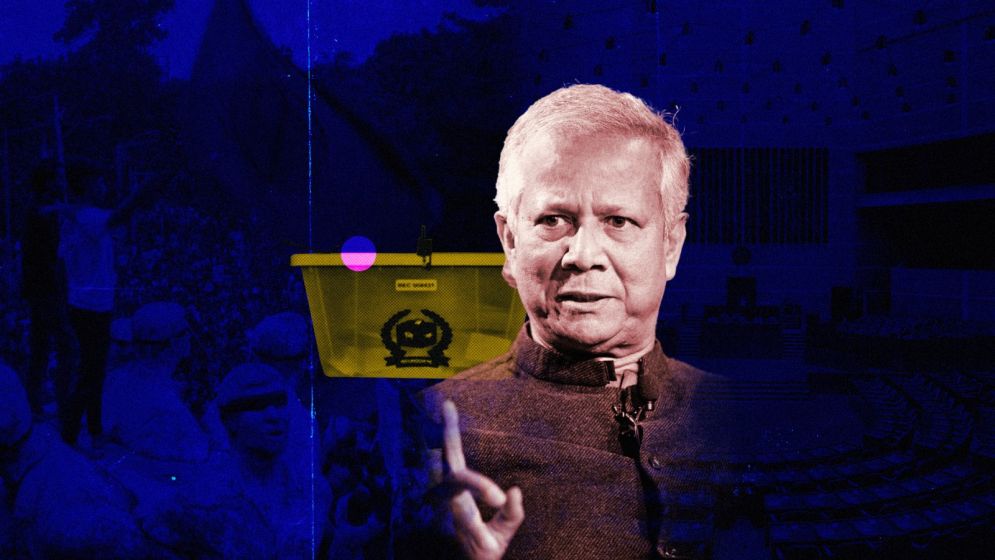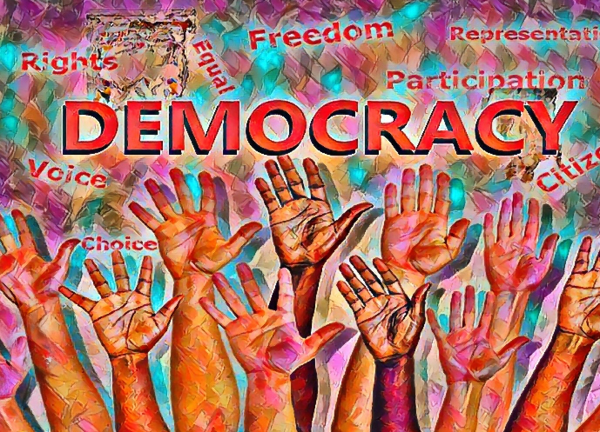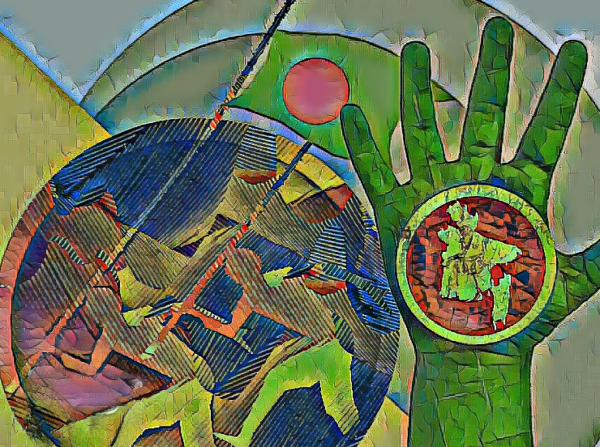Yunus is still the last man standing between order and ruin

It was not with tanks or chants that the most unexpected transition in modern South Asian politics began–it was with a quiet, improbable figure stepping into history.
Dr Muhammad Yunus, economist, social reformer, and Nobel laureate, did not seize power. He filled a vacuum. When the machinery of the Bangladeshi state collapsed into dysfunction and despair, he emerged as a custodian.
For the first time in decades, Bangladesh is not ruled by a party boss, or an army strongman, or the scion of a political dynasty. This moment, historic and fragile, carries the weight of a nation's last good chance to change its destiny. But that hope is evaporating.
What was supposed to be a reset–a break from decades of stolen elections and state-sponsored corruption–now looks alarmingly like a relapse. Dr Yunus, once a unifying figure, now finds himself surrounded by predators.
The political parties that cheered the fall of the old regime have begun their quiet knives-out routine. The BNP, long marginalized, now acts as though the keys to the palace are owed, not earned. Its cadres stalk the civil service and judiciary, claiming space with the arrogance of victors rather than the caution of stewards.
On the other flank, the newly formed National Citizen Party (NCP) has grown skittish. Having never truly tested its strength in open elections, it hides behind procedural delays and “reform timelines,” a euphemism for avoiding the reckoning of democracy.
And in the shadows, the Awami League waits. The party that ruled with a clenched autocratic fist for fifteen years is not gone. It’s merely regrouping, ready to exploit any stumble by the interim government to sabotage the trials of its own crimes–and reclaim the narrative with terrifying ease.
This interim government was not formed to govern. It was summoned to transform. It was tasked with three clear mandates: to dismantle the autocratic machinery that turned a republic into a family business, to bring justice for the atrocities committed in the dog days of a collapsing regime, and to finally deliver a free and fair election.
These
were their existential goals. Fail at any one, and the republic fractures.
Reaching to a boiling point
The tragedy is that the public, for a fleeting moment, believed again. The streets that once echoed with cynicism began to whisper hope. The ballot, long a symbol of futility, began to glimmer with meaning.
But unity, that rarest of political currencies, was squandered almost as soon as it appeared.
What began as a mandate to rebuild is now turning into a game of factional brinkmanship. And Dr Yunus–visionary though he may be–is no political streetfighter.
He does not traffic in patronage. He does not command loyalty through fear. His strength lies in moral authority, and that is not a language the parties understand anymore.
If he falls–if this experiment collapses–the consequences will not be subtle. The democratic project in Bangladesh won’t just be delayed. It will be discredited, perhaps for a generation.
The next regime will rule not with legitimacy but with vengeance. And the memory of this moment, of what might have been, will become yet another scar in a nation already dense with them.
The fact is, the interim government made the oldest mistake in politics: it assumed politics could be outmaneuvered with policy. Armed with white papers, reform roadmaps, and noble intentions, Dr Yunus and his technocratic circle misjudged just how quickly the system would begin snapping back into its old shape.
The bureaucracies, the courts, the police, even the media–each one began tilting toward the loudest and most organized force in the room. Not because it believed in the BNP, but because institutions instinctively align with whoever looks like they might be in charge next.
The BNP rose in momentum. And momentum, absent principle, is a dangerous thing.
If the party now pressing for snap elections simply wants to rush back into office to re-rig the game, or if newer formations like the NCP prefer to stretch out the reform calendar to buy time for their own survival, then let’s dispense with the fantasy.
This is just a land grab disguised as transition. And the one power reaping the most from the chaos isn’t even on the ballot.
It’s India.

From reform to realpolitik
While some critics foam at the mouth about alleged American meddling–parsing a handshake between a U.S. general and General Wakar Uz Zaman like it’s a Zapruder reel, or hyperventilating over an adviser’s Freudian slip about “humanitarian” aid–they conveniently forget their own history.
The outrage feels almost theatrical. Apparently, when Sheikh Hasina’s daughter took selfies with President Biden, it was a diplomatic masterstroke. When Professor Yunus appears with Western leaders–many of whom hold real moral standing–it’s suddenly a violation of sovereignty.
The hypocrisy is grotesque.
Where was this alarm when India quietly redrew the region’s power map through Bangladesh–extracting transit routes, blocking fair water-sharing agreements, allowing its border force to kill Bangladeshis with impunity, and exerting its will across elections and ministries?
Where were the sovereignty hawks then? Silent. Complicit. Often on the payroll. Delhi wasn’t just interfering–it was managing. And for more than a decade, our elites allowed it.
Now, as a non-partisan interim leadership tries to restore the republic’s self-determination, the same actors shriek about “foreign hijacking.” Please. Spare us the pantomime.
What we are witnessing is probably an essential realignment. The Yunus administration is making quiet moves that signal Bangladesh is no longer content to be anyone’s regional pawn.
Talks with China are gaining depth. The J-10C fighter deal is moving forward. Military cooperation is expanding at Lalmonirhat. It’s the language of sovereignty spoken fluently: diversified alliances, deliberate diplomacy, national interest over nostalgic loyalty.
But India, bruised from its diplomatic flops and military stumbles, has responded with petulance. A regional hegemon in decline doesn’t go quietly–it snarls. And its local proxies, long enriched by foreign scripts, have now rebranded themselves as guardians of national pride.
The irony writes itself.
Let’s be clear: sovereignty isn’t about who you shake hands with. It’s about who gets to decide your direction. For the first time in recent memory, Bangladesh has its hands on the wheel. We are not veering West, and we are not drifting East.
We are finally turning inward–toward ourselves. And that, more than anything, is what terrifies those who’ve grown fat on foreign influence and domestic submission.
They fear a country that remembers what it means to choose its own future.
You cannot prosecute fascism when half the political spectrum is camped outside the courthouse, throwing rocks. You cannot conduct a credible election when every major party behaves less like a democratic stakeholder and more like a criminal syndicate guarding turf.
And
you certainly cannot stabilize a collapsing economy while key institutions are
being sold off like distressed assets at a fire sale.
Political harmony is the oxygen
BNP, Jamaat, NCP–this moment demands something none of you seem ready to offer: coalition, not conquest. The burden is no longer on the interim government to prove its neutrality.
The burden is on you to prove you’re still capable of governing a nation and not just scavenging power. This is not a time to jostle for advantage. It is a time to join hands and clean the bloodied floor you all helped stain.
And in the middle stands Professor Muhammad Yunus–not as your rival, not as your ruler, but as the last barrier between institutional collapse and civil disorder. His refusal to play favorites is the feature.
His impartiality isn’t weakness. It is the firewall that still keeps the republic from going up in flames.
Yet, some of you keep pushing him toward the exit. Whispers in the press. Leaks in the bureaucracy. Cold shoulders in the cabinet. Why? Because he won’t take your side? That’s the point–he’s not supposed to.
Understand this clearly: if Yunus goes–whether by pressure, betrayal, or exhaustion–it is not merely the departure of a man. It is the dismantling of a fragile order. The trials against those who brutalized the republic? Gone.
The reforms meant to untangle a fascist state from its dynastic grip? Abandoned. The next election? Another hollow ritual dressed up as legitimacy, with the same ghosts behind new curtains.
If he falls, the republic doesn’t stumble. It fractures.
This is Bangladesh’s third act. Its final inflection point. The brief, rare window where a state battered by decades of kleptocracy, surveillance, and sectarian politics might still write a different ending. But that ending cannot be written without a stabilizing hand–and right now, Yunus is the only one left holding the pen.
If you force it from his grasp, don’t pretend to be surprised by what follows. Don’t feign disbelief when justice collapses, when the streets fill, when history closes the book with a snap.
Because it won’t just be Yunus who’s gone.
It will be the country you claim to serve.
And no one–none of you–will be trusted to rebuild it from the wreckage.
—-
Omar Faris is a writer and an analyst

